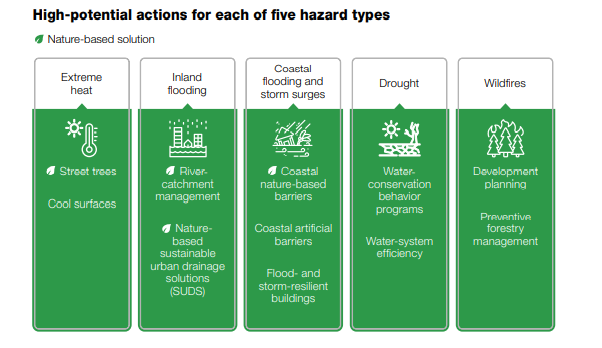
Photo: Kelly Sikkema on Unsplash
Report pinpoints 15 climate adaptation priorities for cities
21 July 2021
by Sarah Wray
A new report from C40 Cities and McKinsey Sustainability aims to help cities cut through the “dizzying array of options” for climate adaptation so they can set priorities and take action.
The research comes during devastating floods, wildfires and extreme heat in several parts of the world.
Focused Adaptation. A strategic approach to climate adaptation in cities outlines 15 “high-potential” actions cities can take, ranging from implementing green infrastructure and emergency warning systems to increasing access to affordable insurance.
“There’s no ‘one-size-fits all’ approach to adaptation and identifying the right steps to take can be daunting,” said Brodie Boland, Partner at McKinsey and one of the report’s co-authors. “There is limited time and resources available for cities to adapt. We hope city leaders around the world will find this report to be a useful starting point to develop their own adaptation agendas.”
While continuing to reduce emissions is key, the report notes that some climate change is already “locked in” so adaptation is critical to protect the lives and livelihoods of urban residents.
By 2050, C40 Cities estimates that more than 800 million urban residents will be affected by sea level rise and coastal flooding. Further, 1.6 billion could be vulnerable to chronic extreme heat, up from 200 million today, and 650 million could face water scarcity.
Solutions
Four of the actions outlined in the report are measures which will strengthen all kinds of cities. These include increasing awareness through risk assessments, incorporating climate risk into urban planning, optimising responses with early-warning systems, and enhancing financing programmes like climate insurance.
The other 11 are hazard-specific and target extreme heat, drought, wildfire, inland flooding and coastal flooding. The report particularly highlights the importance of nature-based solutions, such as planting trees next to streets, river-catchment management and sustainable urban-drainage solutions, due to their impact on reducing risks and their feasibility.

“The impacts of the climate crisis are already being felt across the world’s cities and mayors are taking the urgent steps needed to prepare for a rapidly heating world,” said Mark Watts, Executive Director, C40 Cities.
Scientists are warning that recent extreme weather events, including flooding in Europe and China and heatwaves in the US and Canada, are a taste of things to come.
Previous research from McKinsey has found that in India hundreds of millions of people could be at risk from lethal heat waves, Ho Chi Minh City could face billions of dollars of increased damages from floods, and homes in Florida could be devalued by between US$30 billion and US$80 billion.
The report also offers a four-step path to creating a climate resilience plan, from carrying out a risk assessment to conducting benefit and feasibility analyses on proposed actions.
Research published earlier this year by the environmental disclosure non-profit CDP found that although 93 percent of the reporting cities are facing significant climate hazards, 43 percent still don’t have an adaptation plan in place. One in four said they face budgetary barriers to action.
Image: Kelly Sikkema on Unsplash







